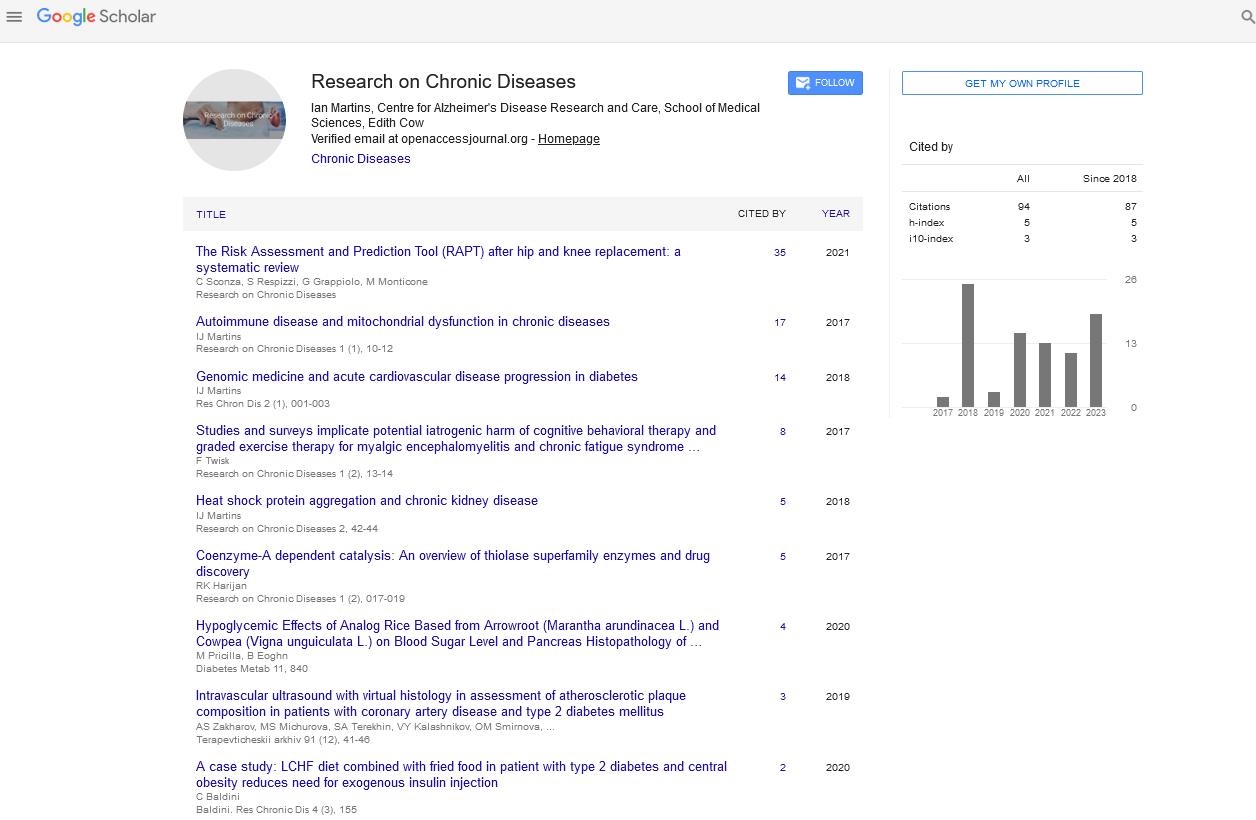Perspective - Research on Chronic Diseases (2023) Volume 7, Issue 5
Unraveling the Mysteries of Autoimmune Diseases: Understanding, Causes, and Hope
- Corresponding Author:
- Marshall K Cheney
Department of Medicine, University of Alberta, Alberta, USA
E-mail: mcheney@ou.edu
Received: 08-Sep-2023, Manuscript No. OARCD-23-118514; Editor assigned: 11-Sep-2023, PreQC No. OARCD-23-118514 (PQ); Reviewed: 25-Sep-2023, QC No. OARCD-23-118514; Revised: 02-Oct-2023, Manuscript No. OARCD-23-118514 (R); Published: 09-Oct-2023, DOI: 10.37532/OARCD.2023.7(5).111-112
Introduction
Autoimmune diseases are a diverse group of conditions that often baffle both patients and healthcare professionals. These disorders involve the immune system, the body’s natural defense against pathogens, turning against its own tissues. Despite affecting millions of people worldwide, autoimmune diseases remain enigmatic, with a complex interplay of genetic, environmental, and immunological factors at play. This article aims to shed light on autoimmune diseases, exploring their causes, diagnosis, treatment, and the potential for future breakthroughs. By the end, you’ll have a better understanding of these conditions, their impact, and the ongoing efforts to uncover their mysteries.
Description
What are autoimmune diseases?
Autoimmune diseases encompass a wide range of conditions, each with its unique characteristics and target organs. From the common rheumatoid arthritis to the lesser-known autoimmune polyendocrine syndrome, the unifying factor among them is the immune system’s dysfunction. It mistakenly recognizes the body’s healthy cells as foreign invaders and launches an attack against them, leading to inflammation and tissue damage.
Examples of autoimmune diseases
• Rheumatoid arthritis: Affects the joints, leading to pain, swelling, and damage.
• Systemic lupus erythematosus: Affects various organs and tissues, causing inflammation and a wide range of symptoms.
• Multiple sclerosis: Damages the protective covering of nerves, leading to communication problems between the brain and the rest of the body.
• Type 1 diabetes: Destroys insulin-producing cells in the pancreas.
• Hashimoto’s thyroiditis: Affects the thyroid gland, causing hormonal imbalances.
• These conditions, among many others, can result in chronic pain, disability, and even life-threatening complications.
Causes and triggers
The exact cause of autoimmune diseases remains elusive, but several factors are believed to contribute to their development. The interplay between genetics and environmental triggers plays a critical role.
Dysregulation of the immune system: A healthy immune system is finely tuned to distinguish between self and non-self-antigens. In autoimmune diseases, this discrimination fails, and the immune system mistakenly targets the body’s own cells. This dysregulation can result from a combination of genetic and environmental factors, including infections and hormonal imbalances.
Diagnosis and challenges
Diagnosing autoimmune diseases is often a complex and challenging process. The symptoms can be vague and mimic other conditions, leading to misdiagnosis or delayed diagnosis. Healthcare professionals rely on a combination of clinical evaluation and laboratory tests to identify these conditions.
Clinical evaluation: Healthcare providers start by taking a detailed medical history and conducting a physical examination. They look for specific symptoms and signs that may suggest an autoimmune disease. Common symptoms include fatigue, joint pain, skin rashes, and fever. The nature and location of symptoms can provide clues to the underlying condition.
Imaging and biopsy: In some cases, imaging studies such as X-rays, ultrasound, and MRI may be necessary to assess organ involvement and damage. Biopsy of affected tissues can also provide valuable information, as it allows direct examination of tissue samples under a microscope.
Challenges in diagnosis: Despite advancements in diagnostic tools, autoimmune diseases often pose challenges. Symptoms may come and go, making them difficult to capture during a single doctor’s visit. Moreover, the overlap of symptoms among different autoimmune diseases can lead to confusion in diagnosis. Patients may undergo years of testing before receiving a definitive diagnosis, contributing to their frustration and uncertainty.
Treatment and management: Autoimmune diseases are typically chronic and lifelong conditions, but their symptoms can often be managed effectively. Treatment aims to suppress the immune system’s abnormal activity, reduce inflammation, and alleviate symptoms. The choice of treatment depends on the specific autoimmune disease and its severity.
Immunosuppressive medications: Many autoimmune diseases are treated with immunosuppressive medications, which dampen the immune system’s activity. Common drugs in this category include corticosteroids, Disease Modifying Antirheumatic Drugs (DMARDs), and biologic agents. These drugs can alleviate symptoms and slow the progression of the disease but may have side effects.
Disease specific treatments: Some autoimmune diseases have disease-specific treatments.
For instance, insulin therapy is essential for type 1 diabetes, while hormone replacement therapy may be necessary for thyroid disorders. Advances in medical research have led to targeted therapies for specific conditions, providing hope for more effective treatments in the future.
Lifestyle changes: Lifestyle modifications play a crucial role in managing autoimmune diseases. These may include dietary changes, stress management, regular exercise, and adequate sleep. Patients are encouraged to work closely with healthcare providers to develop a comprehensive management plan that addresses their specific needs.
Research and hope
Despite the challenges posed by autoimmune diseases, ongoing research offers hope for better understanding and treatment of these conditions. Scientists are exploring various avenues to unravel the mysteries of autoimmune diseases.
Immunotherapy: Immunotherapy, which harnesses the body’s immune system to fight disease, is a promising area of research for autoimmune diseases. This approach aims to reprogram the immune system to stop attacking healthy cells while preserving its ability to combat infections.
Precision medicine: The concept of precision medicine involves tailoring treatment plans to an individual’s unique genetic and molecular profile. This approach is gaining momentum in autoimmune disease research and holds the promise of more effective and personalized treatments.
Patient advocacy and support: Patient advocacy groups and organizations play a vital role in raising awareness, providing support, and driving research efforts. These organizations connect patients with resources and information, offer a platform for sharing experiences, and advocate for increased funding and research into autoimmune diseases.
Conclusion
Autoimmune diseases, with their complex interplay of genetics and environmental factors, continue to challenge both patients and healthcare providers. While diagnosis and treatment can be challenging, ongoing research offers hope for a brighter future.
